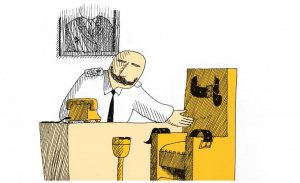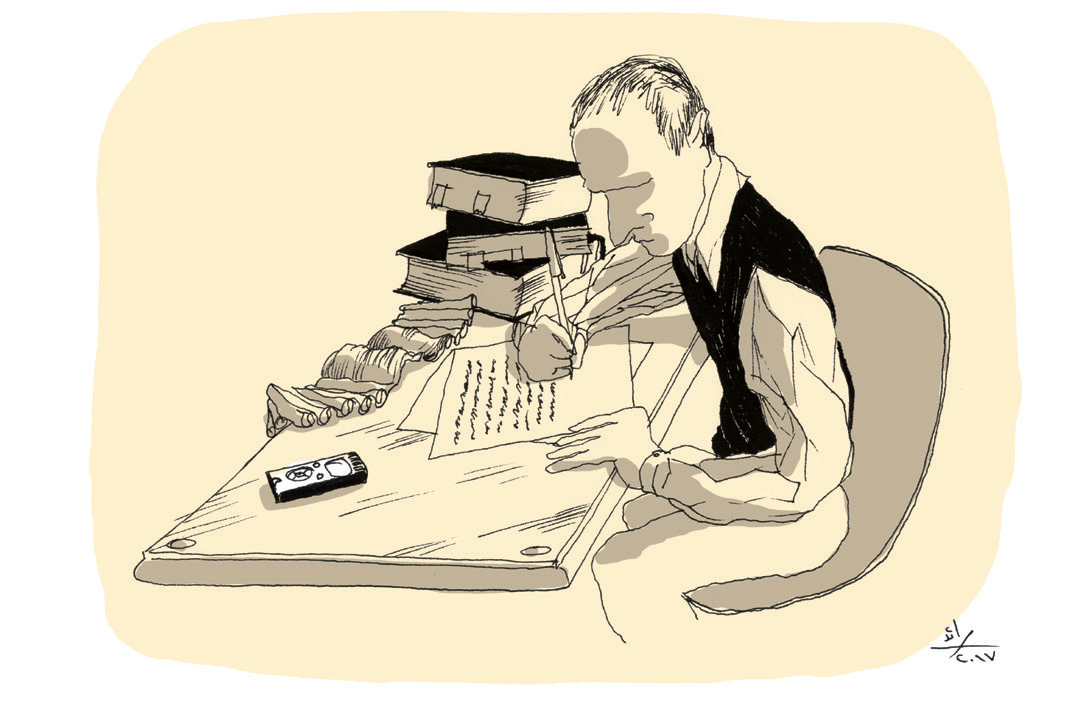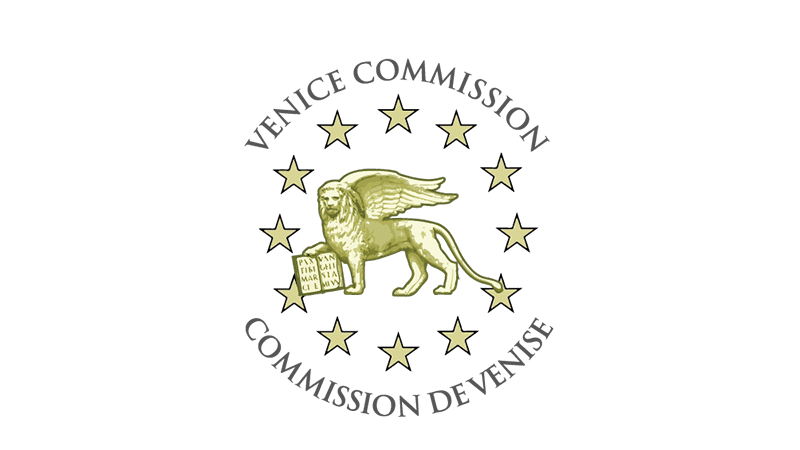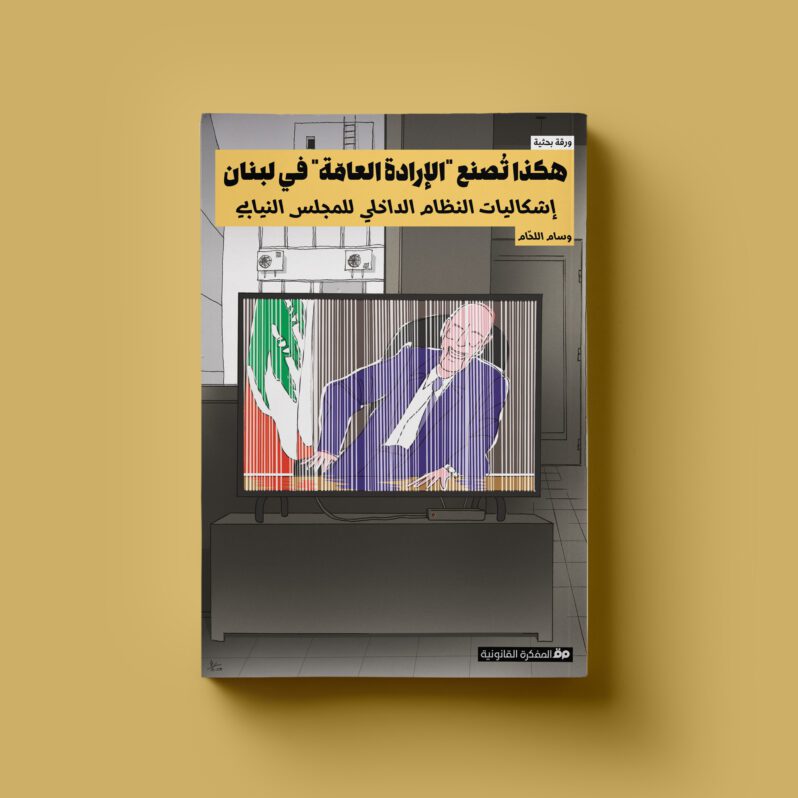Lebanon’s State Council: Redeeming Rights of Lawyers and Foreign Detainees

After a 7-year wait, a final decision was issued in a case brought by Lebanese lawyer Adib Zakhour against the state. Zakhour filed the suit after the country’s General Directorate of General Security (GDGS) issued a decision banning him from entering its office premises, for the purpose of defending foreign clients of his that were detained there. Those GDGS measures were invalidated by the State Council’s April 4, 2014 ruling based upon the principles of lawyer independence and of a fair trial.
The ruling also stipulated compensation to be paid to Zakhour, in the amount of LL (Lebanese Pounds) 20 million [US$13,300] for material and psychological damages, after it was demonstrated that the NGO “Caritas” had ended Zakhour’s contract of cooperation in compliance with the General Security’s “wishes”. As The Legal Agenda previously reported, the reporting judge and the government commissioner arrived at similar conclusions.[1]
It goes without saying that the violation addressed in the decision is a vivid example of what a number of lawyers have been and are subjected to. As I show below, violations such as those committed by the GDGS affect not only lawyers’ personal or professional rights, but more broadly delimit the framework for professional legal practice in cases of foreigners being detained by the General Security. It does so through the imposition of a set of prohibitions whose violation might lead to a person’s dismissal (from working on a case).
Regulating Lawyers’ Conduct: Provoking General Security is a Red Line
In Zakhour’s case, the GDGS issued a notice forbidding Zakhour’s entry in the context of his defending a number of refugees and migrant workers, who were detainees of the Directorate. The latter justified its action by stating that some of its investigators felt “provoked” by Zakhour’s refusal to undertake translation on behalf of his client, a detained female migrant worker in the Directorate’s custody. Zakhour’s compliance which would have been contrary to legal procedures that require persons undertaking such translation work to be sworn translators.
The Directorate was not satisfied with merely issuing the notice. According to the State Council decision, the Directorate went so far as to demand that Caritas, which had employed Zakhour to defend individuals it was providing with legal aid, replace him with another lawyer. Caritas complied with the Directorate’s demand. The former has an understanding with the GDGS that enables the former to maintain a presence within the latter’s premises, and to work with detainees who are under the Directorate’s supervision.
Caritas’s compliance with GDGS “orders” gives a clear idea of the conditions, most of them implicit, that these organizations submit to in return for gaining access by GDGS. It also explains the absence, in statements issued by these organizations, of any criticism of the security apparatus’ practices in detention centers, and of any stance regarding the legality of the detentions themselves. [The organizations] are typically satisfied with focusing on the inhumane conditions that detainees are suffering from. The organization in question, Caritas, acted along these lines when it complied with a GDGS request that Iraqi refugee Yousra al-Amiri be detained – despite a judicial ruling calling for her immediate release due to the illegality of her arrest.[2]
These frameworks that form a necessary part of working with the GDGS in the field of the detention of foreigners lead to the establishment of red lines. The lines are tantamount to norms that are binding upon all those working in the field, even if they compromise a lawyer’s professional principles, the principle of the right to [legal] defense, and consequently, the principles that bind lawyers and organizations that provide legal aid.
Any violation of these norms constitutes a provocation or a harassment of GDGS, or an infringement upon its sensitivities. So much so, that a notice is issued banning the offending party from entering the Directorate’s premises. As such, the GDGS is rendered a regulator of the conduct and professional ethics of legal aids involved. In doing so, it is exceeding the bounds of its authority and encroaching upon that of the Lawyers Syndicate, which remains the primary responsible body when it comes to lawyers maintaining professional ethics.
These imposed norms have negative repercussions on the rights of the detained in question as well. The legal protection that detainees are afforded remains at a minimum. Hence, it is clear that the consequences of the State Council’s ruling are not limited to the lawyer in question, but have repercussions for all others working in the legal field who are subject to the same sort of norms.
Administrative Judge: The Law is the Red Line
These repercussions are not lost on the State Council, which appears eager to restrain the General Security’s authority, and to ensure that respect for lawyers’ independence and the principles of fair trial are a priority again. Accordingly, the Council reminds the General Security that “in accordance with Article 99 and what ensues in the law governing the legal profession, the regulation of lawyers’ conduct belongs exclusively to their own disciplinary council. In accordance with Article 492 and what ensues in the Code of Civil Procedure, both the regulation and the administration of trial sessions are the responsibility of the president of the court”.
It added the rationale that “there is no text in observed laws and regulations of procedures granting the General Director of General Security, or any other security source, the authority to prevent lawyers from being present during investigatory hearings that take place in their premises”. The ruling concludes, on this note, by stating that “the contested decision was issued from an invalid source, and merits nullification”.
The State Council was unequivocally clear regarding the illegitimacy of notices of suppression, or those forbidding entry into security centers in general. Likewise, the ruling pointed out “that seeking legal counsel is reserved exclusively to the litigant, by virtue of their selecting a lawyer of their choice as their proxy, and in accordance with Article 808 of the Code of Obligations and Contracts, and Article 385 of the Code of Civil Procedure, and the authority to dismiss a contracted agent is reserved exclusively to the client”.
This rationale indicates the administrative judge’s intention to limit GDGS practices, specifically those of assessing lawyers’ work and deciding who is and who is not appropriate to defend detainees. The GDGS enforces such practices by exercising/abusing their discretionary power which is in violation of the law.
The ruling concludes that it is incumbent “to compensate the damaged party (the lawyer Adib Zakhour) for material and psychological damages, in the amount of LL20 million [US$13,300], with 5% interest effective from the date of the issuance of the ruling until the date of actual payment”. Calling for compensation reveals the Council’s wish to penalize, and not merely condemn GDGS actions. By doing so, it renders the latter’s sense of sensitivity a costly affair that is better dealt with, rather than transformed into a scarecrow to punish whomever provokes it.
The ruling merits follow-up in the realm of public opinion to ensure it’s implementation and for it to become a definite deterrent. In anticipation of the State’s failure to implement the ruling, Zakhour had requested that the state administration pay a compulsory fine of US$5,000 for every day of delay in implementing the decision. However, the Council responded to his request by citing the need to present the ruling to an independent review following its issuance.
In conclusion, the essence of this ruling lies in the process of controlling the actions of the administration by judicial means, and the rectification of that behavior through legally legitimate means. Most importantly, the ruling represents an entry point for rearticulating the principles of a lawyer’s independence, a fair trial, and equality between litigants – including those who are foreign. How will the ruling impact the Lawyers Syndicate’s review -currently underway – of how the GDGS deals with lawyers? The latter needs radical revision. More broadly, how will the ruling affect the principles of a fair trial, particularly the role of lawyers in defending clients who are being detained by any of the security agencies? These are questions that will require careful follow-up.
This article is an edited translation from Arabic.
_____________________________________________________________________
[1] See: Nizar Saghieh’s, “The Case of a Lawyer Prevented From Practicing his Profession by the General Security Before the Lebanese State Council: Sacrificing the Principles of a Fair Trial Because of “Sensitivity””, The Legal Agenda, Issue No. 14, March 2014.
[2] See: Sarah Wansa’s, “The Case of Yousra al-Amiri: Or, When the Media Defended the Power of Judicial Rulings in Lebanon”, The Legal Agenda, Issue No. 15, April 2014.



